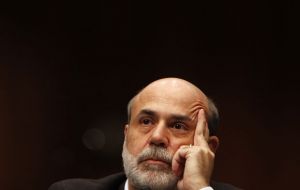MercoPress. South Atlantic News Agency
US recovery still needs help for stronger job creation, says Bernanke
 Fed chairman: unemployment too high, inflation too low
Fed chairman: unemployment too high, inflation too low The US economic recovery still needs help from the Federal Reserve despite signs of improvement, the central bank's chairman Ben Bernanke said.
The Fed chairman provided a modestly more rosy outlook for the world's largest economy than he has done in recent appearances, citing gains in household spending, improved confidence, and stepped up bank lending as signs 2011 may bring stronger growth than 2010.
“Although economic growth will probably increase this year, we expect the unemployment rate to remain stubbornly above, and inflation to remain stubbornly below, the levels that Federal Reserve policymakers have judged to be consistent over the longer term with our mandate,” he said in an appearance at the National Press Club in Washington.
His comments on the economy on Thursday suggest a Fed that believes it has plenty of time to let its policies boost growth and pull down a high unemployment rate before it needs to worry about tightening financial conditions to keep any inflation in check.
The hard hit job market shows some grounds for optimism, but modest growth and cautious hiring suggest that it will be several years before the jobless rate returns to a more normal level, Bernanke said.
“Until we see a sustained period of stronger job creation, we cannot consider the recovery to be truly established,” he said.
Some analysts worry the Fed is underplaying gains in the recovery and is turning a blind eye to inflation pressures that may be building as evidenced by rising commodity prices around the world.
Economic data this week pointed to stronger growth momentum, as the U.S. services sector grew at its fastest pace in more than five years, factory orders picked up and claims for jobless benefits fell off sharply.
Bernanke played down worries that recent commodity price rises pose an inflation threat. “Overall inflation remains quite low,” he said.
The Fed in November launched a new round of bond-buying, to be completed by mid-year, to support a recovery that appeared to be flagging. The US central bank had already bought 1.7 trillion USD worth of longer-term assets to provide further stimulus for the economy after cutting benchmark short-term rates to near zero in December 2008.
The Fed chairman defended the central bank's controversial bond buying program, saying its benefits are evident from a range of financial market metrics. He cited higher stock prices and less volatility in equities markets, and narrower spreads between riskier and less risky corporate bonds.




Top Comments
Disclaimer & comment rules-

-

-

Read all commentsEgypt -)-)-)-)-)-)-)-) USA ! why not !
Feb 04th, 2011 - 09:36 pm 0print more of those green papers, at least you'll live the fantasy :)
Feb 05th, 2011 - 12:11 am 0http://inflation.us/videos.html
Feb 05th, 2011 - 01:33 am 0Commenting for this story is now closed.
If you have a Facebook account, become a fan and comment on our Facebook Page!